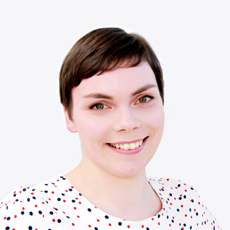This time, I chatted with a true Sandberg stalwart. Danielle started at the company in 2005  when it was still based in Durley. At that time, there were only 15 people working in what was then Sandberg’s only office, and Danielle was one of only two English translators. She later moved to the office in Whiteley as the company grew before relocating to Leeds in 2018. She now works from home.
when it was still based in Durley. At that time, there were only 15 people working in what was then Sandberg’s only office, and Danielle was one of only two English translators. She later moved to the office in Whiteley as the company grew before relocating to Leeds in 2018. She now works from home.
Which languages do you speak, Danielle?
English and Swedish, but I understand Norwegian and Danish as well, and a bit of French, too. I also did Latin at school and at university, but I’ve forgotten most of that! I did study Polish for a couple of years, but haven’t really kept it up.
What did you want to be when you were growing up?
I didn’t have a career in mind when I was little, but I wanted to do something with languages. No one in my family had gone to university, so there wasn’t a huge variety of careers in my background. I just knew I didn’t really want to be a builder, a plasterer or a farm labourer!
How did you end up working in the translation industry?
For reasons I can’t remember, I decided to study Swedish at university. I wanted to use my degree in a relevant field. I did try teaching, but I came to realise that translation was the perfect career for me.
What does a normal day look like for a lead translator at Sandberg?
In general, roughly the same as for the other translators. Since I’m a lead translator, it is more likely that project managers send queries from freelancers and clients for me to look at. I’m responsible for updating our English language style guide and our internal client-specific style guides. I also stay in touch with the other lead translators and our line manager.
I’m the terminologist for the Nordic-English team, so I spend time checking existing term bases and adding new terms to them.
What differences are there between working at the office and working from home?
It’s quieter – and as tidy as I like it! If there’s any washing up in the sink, I know it’s mine! I can’t just walk over to someone and ask them a question any more, but I can easily contact anyone I need to online. You get used to that.
I do miss the lunch time chats about films and books. Now we have the Leeds office, though, which has offset that a bit. I can meet up with them to do that outside work!
What’s the most important quality for a good translator?
Conscientiousness. You have to be prepared to check and double check things. Especially now in the age of machine translation post-editing. You need to be conscious of all the different reference materials for a job and make sure the machine translation engine hasn’t missed anything. On top of that, you need to take into account the fact that the source text might have some mistakes in it as well!
How do you look after your target language skills?
I read a lot, older and newer books. Language does change! I try to be mindful of the fact that other people use language in a different way than I do. I live in my native country, so it’s less of an issue for me.
How about your source language skills?
I guess it’s similar to how I look after my English skills. I listen to Swedish radio programmes, for example Språket, which is a programme all about language. It airs on P1 but you can download it online as well. And I watch a lot of Swedish and Danish programmes in particular and chat to Swedish friends in Swedish.
It’s actually quite hard to find a way to subscribe to magazines or to order books from the Nordic countries to be shipped to the UK. I swap books with a Swedish colleague and I’ll pick up some new ones when I go to Copenhagen later in the year. I do get the magazine published by the Language Council of Norway. That helps with bokmål and nynorsk as well, though mostly we translate from bokmål.
Now would be such a good time to learn a foreign language, since you have all of these resources available to you online! When I was studying Swedish at university, you were reliant on what you had access to through your department.
What is your favourite part of your role?
Probably the terminology work I do. I’m just a bit obsessed with it! I find that quite satisfying.
Machine translation – friend or foe?
Somewhere in between! When it’s bad, it’s very bad. When it’s good, it can be a little bit confusing. It can speed up your work, but you have to be careful.
What do you specialise in?
I do like doing medical work and building up the glossaries for that to make sure I get the benefit from them. I enjoy working on texts on environmental subjects, renewable energy and so on. As a lead translator, you need to be able to go through everyone’s work in every domain, of course!
What motivates you in your work?
If possible, trying to make the translation read better than the source text. I can’t always do that, but that’s the ideal.
If you could do any other job for a week, what would it be?
It’s not really a job that exists, but I’d like to go around correcting mistakes in English! I’d just like to wave a magic wand and make all the spelling mistakes and errors right. That’s more a vocation than a job!
If you could wake up and be fluent in a new language, what would it be?
Probably Finnish – just because it is so difficult. I took some courses in Finnish linguistics and literature and the fundamentals of Finnish language while I was an exchange student in Sweden, but I never learned to speak it.
Do you have any language-related pet peeves?
So many! They’re usually grammar-based. I confess I am a bit of a grammar snob. I think maybe people saying things being Scandinavian when they really should say Nordic! The Scandinavian peninsula doesn’t cover Finland or Iceland.
Apart from that, apostrophes are the most obvious one in English. I think the rules are rather easy, so it annoys me that people still get it wrong. I can only hope that the English language skills taught in school are better now than they were when I was at school. Latin classes helped me with grammar more than the English classes – shout-out to Miss Mills!
What’s your favourite word?
I generally like place names; my current favourite is Kirkstall in Leeds because it comes from Old Norse. It basically means ‘site of a church’, which means that Kirkstall Abbey is a bit tautological as a name!
What’s the one thing about you that surprises people?
I don’t drink tea. Just because I’m English and that’s the one thing everyone assumes about English people!
Otherwise, I’m pretty much what you see is what you get, to be honest. People might be surprised to learn that apart from sci-fi and gardening, I also enjoy motor racing – Formula One.
I also walk around picking up litter and bringing it home, kind of like plogging without the jogging part. I want to set up a new group for litter picking in my neighbourhood.
How do you unwind at the end of a long day?
Reading and when it’s a bit warmer I might go out for a walk or go to the pictures. I like my sci-fi!
Describe Sandberg in three words.
Expanding, inclusive, committed.




